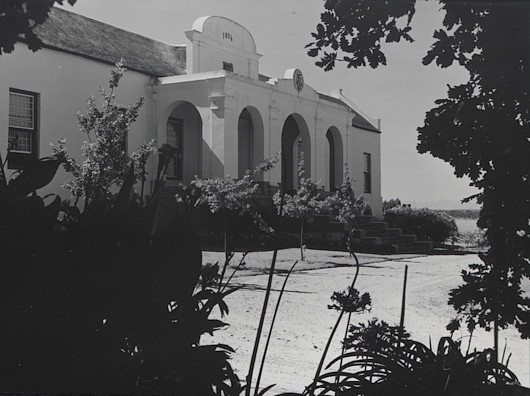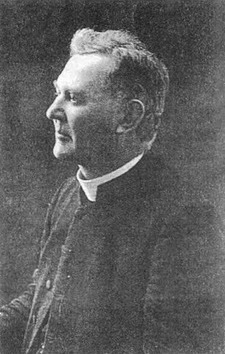2017 September
About Andrew Cusack
 Writer, web designer, etc.; born in New York; educated in Argentina, Scotland, and South Africa; now based in London.
Writer, web designer, etc.; born in New York; educated in Argentina, Scotland, and South Africa; now based in London. read more
News
Blogs
Reviews & Periodicals
Arts & Design
World
France
Mitteleuropa
Knickerbockers
Argentina
The Levant
Africa
Cape of Good Hope
Netherlands
Scandinavia
Québec
India
Muscovy
Germany
Academica
F.C. Kolbe and the Tulbagh Drostdy
the Tulbagh Drostdy
Poet, Polemicist, Polymath, and Priest

Relic and emblem of a storied past.
Thrice happy they whose lines in thee are cast
Thy records summon all in thy embrace
To emulate the virtues of the race.
Thy stately halls of courtly manners tell,
Where only Ladies Bountiful should dwell.
Thy solid frame is pledge of future glory,
And links our doings with our country’s story.
Work on the Drostdy (magistrate’s house) at Tulbagh in the Western Cape began late in 1804 but progressed rather slowly and expensively. This is probably because — after construction commenced — the plans by Bletterman, the landdrost at Stellenbosch, were torn up by the architect Louis Michel Thibault and replaced by his own design.
This meant part of the work already completed had to be demolished and re-done, which Bletterman only went along with assuming Thibault’s plan had the approval of the Batavian Republic’s governor of the Cape, Jan Willem Janssens. As it happens, they did not, and when Bletterman found out he was none too pleased.
Francis Masey, a partner at Herbert Baker’s firm, noted that “[w]hilst it proved to be the last building begun upon Dutch soil in South Africa, it was destined to be the first completed upon the passing of the Cape into the hands of the British.”
This  brief ode was written by Frederick Charles Kolbe (right) in 1909. The great-great-grandson of the magistrate (or landdrost) at Stellenbosch, F.C. Kolbe was the son of a Congregational missionary in Paarl who studied law at the Inner Temple in London. There, in 1876, he was received into the Catholic Church and continued on to study in Rome where he was ordained a priest in 1882.
brief ode was written by Frederick Charles Kolbe (right) in 1909. The great-great-grandson of the magistrate (or landdrost) at Stellenbosch, F.C. Kolbe was the son of a Congregational missionary in Paarl who studied law at the Inner Temple in London. There, in 1876, he was received into the Catholic Church and continued on to study in Rome where he was ordained a priest in 1882.
While his poetry was tended towards the middling, Kolbe was a distinctive polymath. In addition to catechetical writings, he published a number of works on Shakespeare, and lectured on Socrates not long after his 1882 return to the Cape. Eventually he was appointed Reader in Aesthetics at the University of Cape Town.
Kolbe also wrote a Catholic criticism of the 1926 book Holism and Evolution by the statesman General Smuts. (Not many people realise that the word ‘holistic’ was donated to the English language by a son of Stellenbosch.) The general and the priest had corresponded as early as 1915 when Smuts was Minister for Defence, and Smuts was so taken with Kolbe’s critique that he wrote a foreword to a later edition of it.
In a 1935 letter to “Dr. Kolbe”, the General wrote:
Although I am not acquainted with the Catholic prayers, I am deeply versed in the Psalms of the Old Testament, which seem to me the greatest and noblest outpourings of the human spirit ever put into language. The inexpressible finds expression there. Emotions almost too deep for utterance somehow find an outlet there. …
I also agree with you as to the nobility of the language which Catholic Christianity has evolved. What could match the beauty of De Imitatione Christi? Somehow it breathes a spirit which is beyond all language. It is curious how in such a case the human soul sets on fire its own earthly vesture, and language becomes a blaze of glory…
From Smuts’ letters to others we know that he actually read more works by Kolbe, in particular his Up the slopes of Mount Sion: or, A progress from Puritanism to Catholicism.
Disputation and discussion were also among Kolbe’s talents. He used the pages of South Africa’s Catholic Magazine to counter the accusations of what he called a “narrow clique” of anti-Romish ministers of the Dutch Reformed Church.
One of Kolbe’s most lasting legacies was the effect of his writing on the young Afrikaner philosopher Marthinus Versfeld (1909–1995) who converted to Catholicism under the late Monsignor’s influence. (Kolbe had died in 1936.) Versfeld’s familiarity with Augustine and Aquinas helped him launch intellectual attacks against the so-called “Christian-national” thinking behind apartheid, particularly in his first book Oor gode en afgode (“Of Gods and Idols”, 1948 & republished 2010).
Kolbe, according to Versfeld, “lived out a certain apprehension of the presence of the universal in the particular, just as Newman lived out his vision of the Catholic Church in the material of English circumstances.”
An Afrikaner Newman, perhaps? Worth reading more about.
The French Way of War
I’ve  been reading Lartéguy recently so was intrigued to hear of another French writer formed by his military experience, Pierre Schoendoerffer (right).
been reading Lartéguy recently so was intrigued to hear of another French writer formed by his military experience, Pierre Schoendoerffer (right).
In a tweet, the cigarette-smoking Helen Andrews shared an article called What a 1963 Novel Tells Us About the French Army, Mission Command, and the Romance of the Indochina War.
I dislike the romanticism surrounding the magnificent losers vs. ugly victors dichotomy – a magnificent victory is infinitely preferably to both. Hence why my natural Jacobite sympathies are highly qualified by complete and utter disdain for Charlie’s unwillingness to see the task through. (An easy judgement when made from centuries of hindsight, I’ll concede.)
Anyhow, I sent the article to The Major and he proffered this reply:
I was going to say something snide about the French army but to be quite honest I have thought for some time that it is rather better than ours [Ed.: the British]. Their officers are tougher, harder, and more professional than ours – those I encountered professionally certainly were. They are also not infected by the political correctness which is wrecking/has wrecked our army (among other factors).
The distinction between the colonial army and the large conscript army at home is valid. It was the conscript army which was defeated in 1870, 1914, and 1940… not the colonial army to which the modern French army now looks.
It is also true that the US Army don’t do Mission Command well. The Marines on the other hand…
Meanwhile back in the States the prolific Ken Burns has done an eighteen-hour documentary on the Vietnam conflict which allegedly ignores all the scholarly input of the past two decades. Nevermind, we just regret it won’t feature the late great Shelby Foote, who (in Burns’s ‘The Civil War’) spoke with such assurance you imagined he was there.
Urgent Action for Catholic Free Schools
Since the Free Schools programme was introduced in 2010 (allowing parents and other groups outside the state to start and run schools) more than 400 new schools have been approved for opening, providing over 230,000 new school places across the country.
During the Coalition, though, the Liberal Democrats insisted on putting a 50% cap on admissions for free schools that are faith-based. Because Catholic schools are not allowed to reject Catholics simply because of their faith, the policy’s only real effect has been to entirely prevent any Catholic free schools from opening, while failing to do anything about the integration of religious or ethnic minorities.
The Prime Minister has rightly pointed out that “Catholic schools are more ethnically diverse than other faith schools, more likely to be located in deprived communities, more likely to be rated Good or Outstanding by Ofsted, and there is growing demand for them.”
As the British population has increased, the shortage of new Catholic school places has only become more alarming. When the Prime Minister announced the cap would be dropped, Catholic dioceses sprang into action making plans for Catholic free schools. Some even bought sites, one being located next to a hospital to educate the children of immigrant nurses and medical staff who’ve come from Catholic countries to staff our NHS.
But right now Catholic free schools are under threat. Despite a solemn commitment in the Conservative manifesto, Education Secretary Justine Greening is believed to be inclined to make a U-turn and keep the admissions cap which acts as a ban on Catholic free schools.
I ask that you email your Member of Parliament right now, asking him or her to contact the Education Secretary and request that this manifesto commitment be honoured and the faith-based admissions cap be scrapped. A decision is likely to be made very shortly, so time is of the essence.
Many thanks,
Andrew Cusack
To find your MP’s contact details, put in your postcode at this link.
As one of your constituents I am writing to ask you to help scrap the faith-based admissions cap for free schools.
The Government is right to be concerned about the integration of religious and ethnic minorities. This policy, however, began with the best of intentions but has been proven a complete and utter failure. Exhaustive research has proved the cap is completely ineffective towards its stated aim.
Canon law forbids Catholic schools from rejecting fellow Catholics purely on the basis of their faith, which the admissions cap requires. The cap’s only real effect has been to prevent the foundation of Catholic free schools, despite the dire need for quality school places amongst the poorest in our communities.
Catholic schools, meanwhile, are profoundly diverse and educate the children of many faiths and of none. More than 26,000 Muslim pupils are currently receiving education in Catholic schools. One in seven ethnic minority pupils in England & Wales attend a Catholic school, including more than one in five black children.
Across the board, Catholic schools educate 21% more pupils from ethnic minority backgrounds compared to other schools, and these pupils in Catholic secondary schools perform better at GCSE than the national average. These schools also have a record second to none in looking after the most disadvantaged in our society. 16.5 % of pupils in Catholic secondary schools live in the most deprived areas, compared to 11.3% nationally.
Before the election, the Conservative government openly stated its intention to scrap the faith-based admissions cap, which requires only the Education Secretary’s signature to be enacted. The Conservative party then went to the nation in a general election and included this promise in its manifesto.
I ask that, as my MP, you urgently contact Justine Greening MP, the Secretary of State for Education, and ask her to honour the manifesto commitment to scrap the faith-based admissions cap.
Yours,
NAME
FULL POSTAL ADDRESS
Search
Instagram: @andcusack
Click here for my Instagram photos.Most Recent Posts
- Silver Jubilee November 21, 2024
- Articles of Note: 11 November 2024 November 11, 2024
- Why do you read? November 5, 2024
- India November 4, 2024
- The Lithe Efficiency of the Old Constitution November 4, 2024
Most Recent Comments
Book Wishlist
Monthly Archives
Categories


